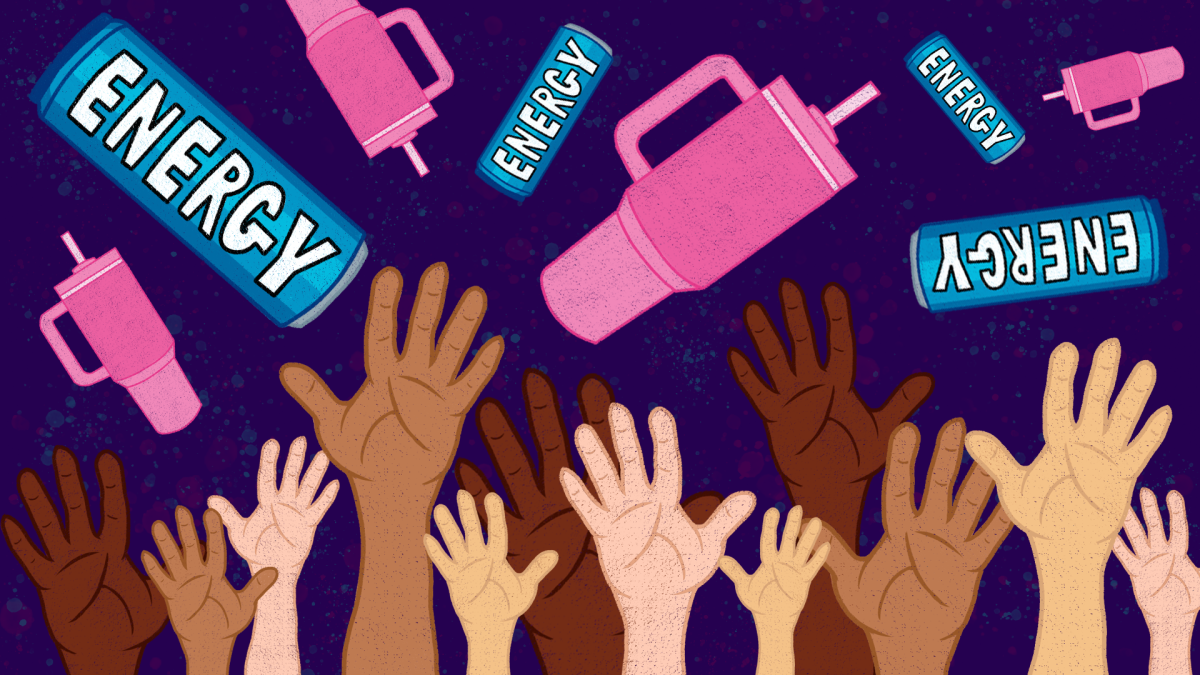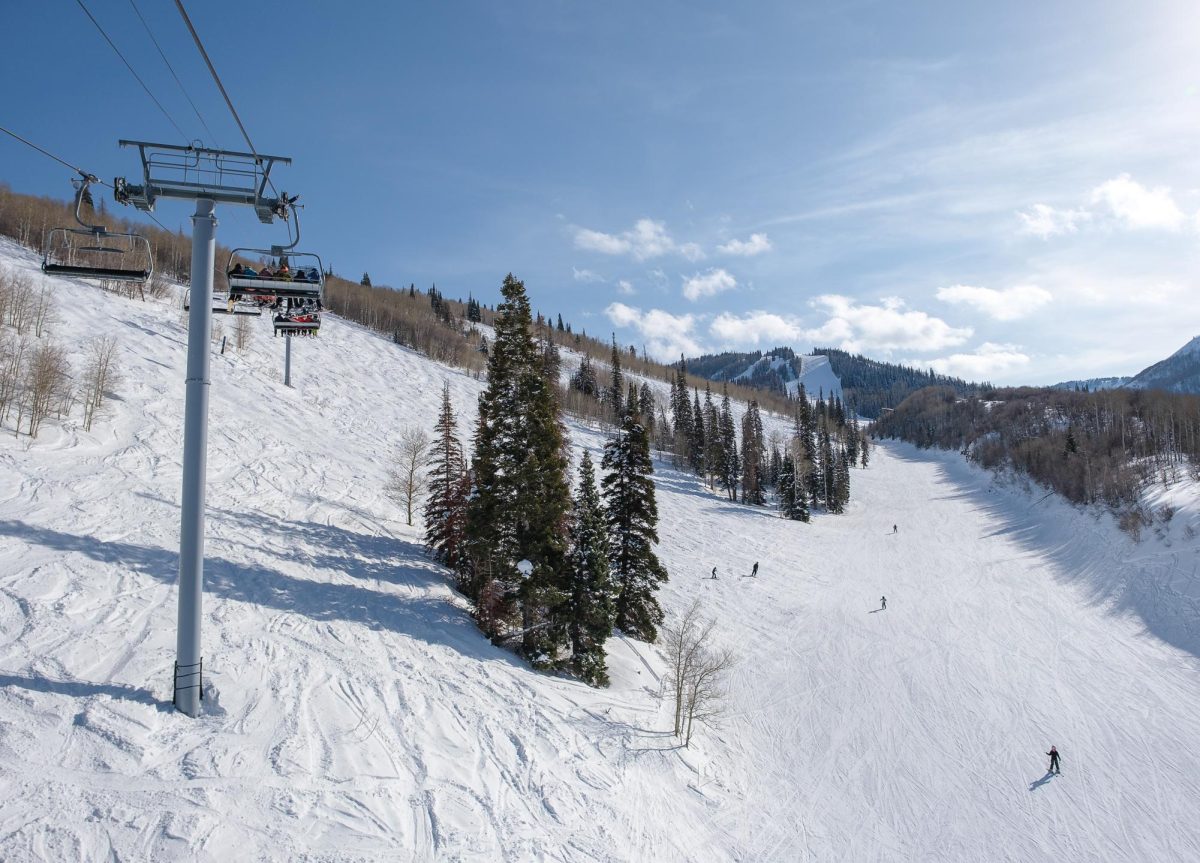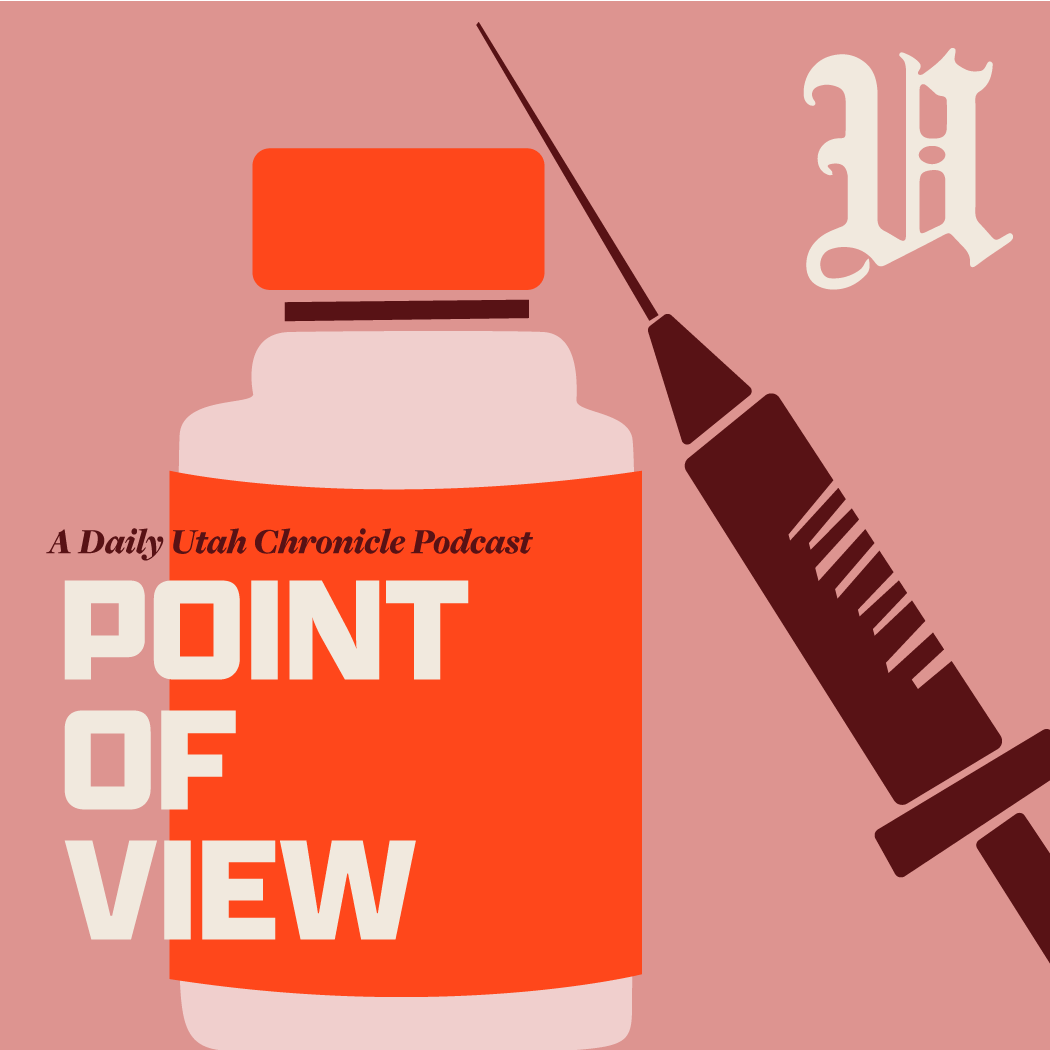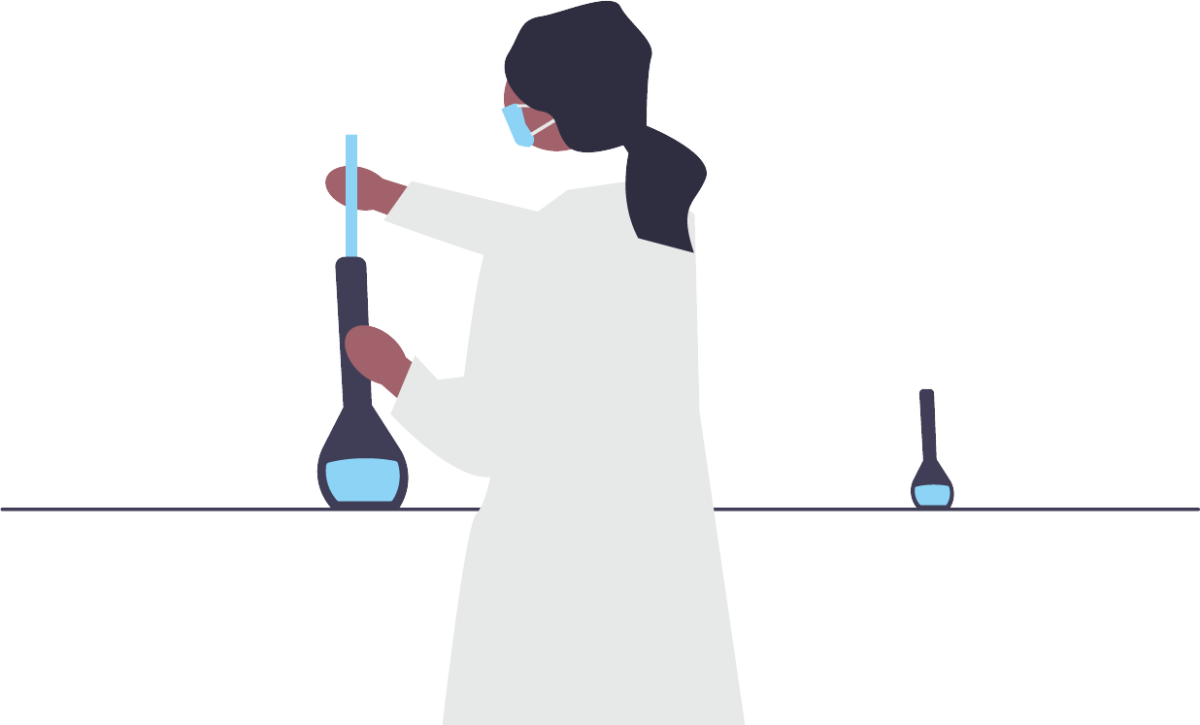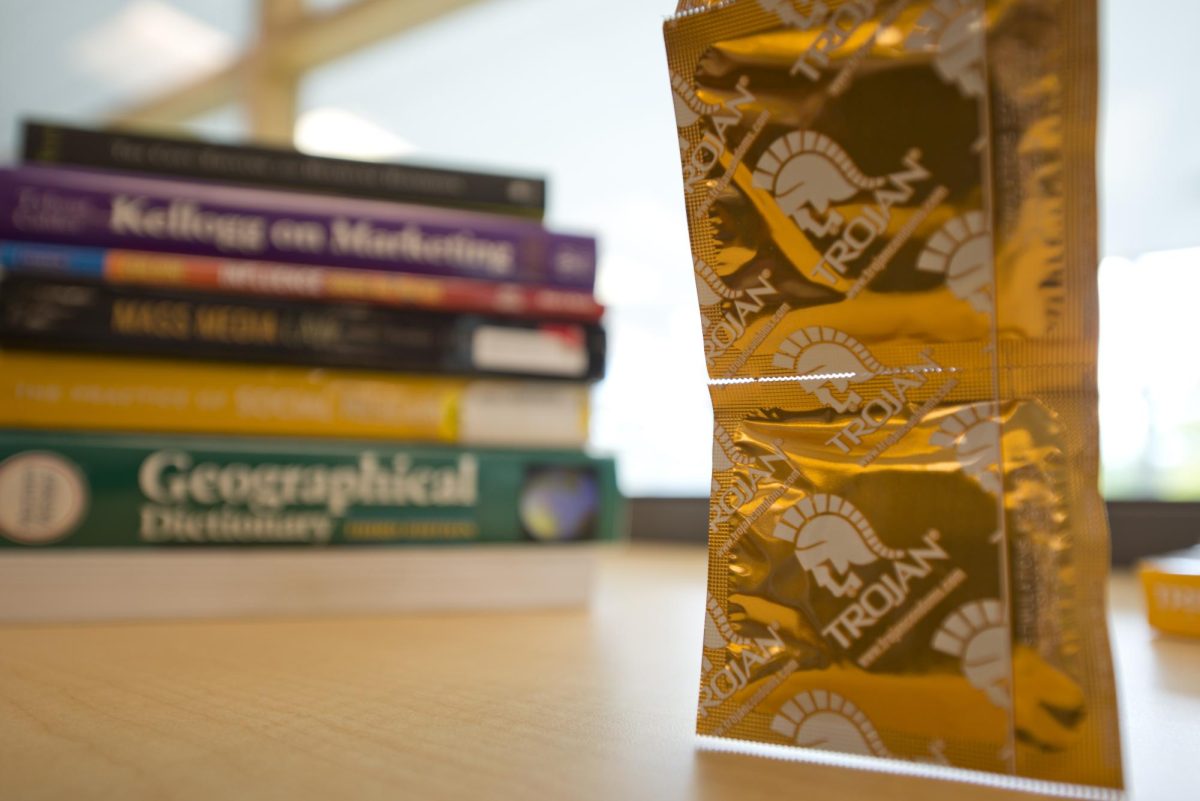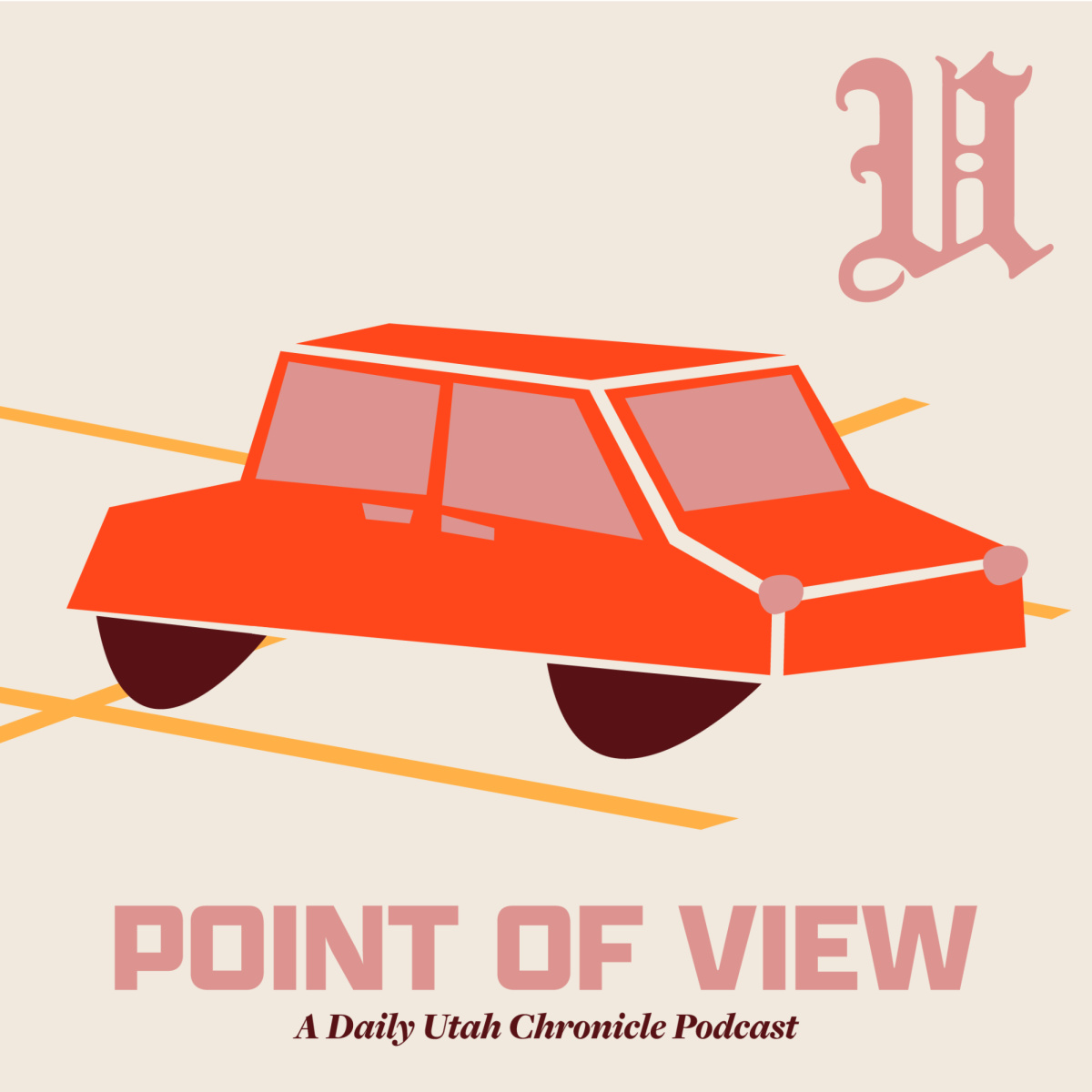Transcript:
Estella Weeks: Hi everyone, and welcome back to Point of View, The Daily Utah Chronicle’s opinion podcast. My name is Estella Weeks and I’ll be your host today. Today, we have on Jeffrey Langley Jr. Jeffrey, if you wouldn’t mind introducing yourself, your major and, like, what you do here at the Chronicle.
Jeffrey Langley Jr.: Hey, yeah, I’m Jeffrey Langley, Jr. as per previously stated. I am a philosophy and political science major here at the [University of Utah]. I am currently in my second year, but a little bit more than a sophomore by credit, so, yeah. I’m just kind of in a weird middle part.
Estella Weeks: Yeah, that’s cool. So what do you do here at the Chronicle? Because, I think you mentioned that.
Jeffrey Langley Jr.: Yeah. I’m a opinion writer for The Daily Utah Chronicle. I write a lot about environmentalism and state policy. But yeah, I also write a lot about cars and transportation policy, which we’ll be talking about here pretty soon.
Estella Weeks: Yeah. So kind of a great segue, what’s your overall general opinion about, like, cars? Just, I’ve heard you have an interesting opinion.
Jeffrey Langley Jr.: Yeah, you’re kind of opening Pandora’s Box here. Like, I’d like to come out and say, first and foremost, I have a very negative and critical view of cars and car infrastructure in general. It’s almost entirely negative out of certain niche areas. So firstly, in urban spaces, like Salt Lake City, and pretty much any area where a large concentration of people live, cars are one of the worst forms of transportation when used as the main source of transportation and that’s in terms of efficiency, environmental outcomes and public health. The simplest way to understand that is just imagining the ratio of space that is taken up by a type of transportation, i.e. cars, and the amount of people they transport. So cars, you know, they will take up a horizontal space equal to, you know, about a lane of traffic, and at max, you’re talking four, six people, depending on how willing you are to cram in.
Estella Weeks: Maximum, too. It’s not just like a one person going to school or going to work, you know.
Jeffrey Langley Jr.: For sure, and when you’re looking at a bus, on the other hand, it’s the same amount of horizontal space with dozens of people and once you start applying the same principle to different forms of transportation like trains, and bike lanes, and even pedestrian spaces, cars just don’t really give you a lot of bang for your buck. Pretty much, it’s, it takes up a lot of room for not a lot of service. I guess that’d be the best way to put it. You know, they give off fumes and noise pollution, which are both linked to pretty bad health outcomes in general. I know like, even, like a small bit of car emission fumes can lead to depression and anxiety alongside the obvious lung health issues. And this is compounded by the fact that cars are generally getting bigger. Yeah, also just driving in general compared to other types of transportation puts you at risk for obesity [and] deep vein thrombosis, which is pretty much like blood clots in deeper areas of your legs and arms especially. And depression, feeling of isolation, especially for people who have longer commutes. It’s just a really, it’s, it’s a really bad compared, compared to other types of transportation.
Estella Weeks: Like public transportation?
Jeffrey Langley Jr.: Yeah, for sure, and walking and biking. Those are two. Yeah, this goes without mentioning the obvious environmental impact cars pose. Cars and other types of automobiles are [among] the leading cause of carbon emissions of anything of human creation.
Estella Weeks: Over so — like, planes?
Jeffrey Langley Jr.: Oh, yeah, for sure, because we have tons more cars and automobiles, just in general, compared to planes and stuff like that. The roads also absorb a lot of heat, which makes this thing called the urban heat island effect, and that pretty much means that like when you’re walking on a sidewalk, it is far hotter than it would be if you’re walking on like grass or somewhere else because of how much heat is captured in asphalt, and this can be really bad for certain cities like in Arizona and maybe even southern Utah. It’s very actually dangerous to be out on the road, walking in when it’s really hot out, and that’s when you see, like, people, like, cooking eggs on the side of the road, and it’s really, it’s really no good. Now, all this goes without saying that I don’t think that cars should just be completely eliminated, like, scrapping every piece of car infrastructure in the United States, because that would be unrealistic and silly. But overall, in most situations, especially if you’re living in an urban area, public transport, walking, biking, all those other alternate forms of transportation are way better than you, for you and your health and the environment. When we’re talking about parking, parking issues, from what I understand, are usually planning, like they stem from planning issues. And what I mean by that is that when we build, you know, new roads and new parking lots and just any other types of car infrastructure, we actually induce demand for more driving. So when, let’s say there’s a new, huge parking lot, like imagine, like, outside of Walmart, or whatever, more people are keen to drive when there’s stuff like that being built. So, you kind of lock yourself into this, like continual expansion and it’s really just kind of detrimental to, you know, logically building a place. Because once you, once you get into that system, it’s just really hard to get out of, because you just have to constantly keep building. So that’s usually why I’m not a big fan of, like, huge parking lots.
Estella Weeks: Yeah, because it kind of enforces the fact that people would want to drive there more.
Jeffrey Langley Jr.: Yeah and then that compounds all the other issues I was talking about earlier.
Estella Weeks: Yeah, yeah, that makes sense. So what are like the ongoing parking debates that, you know, that are going on, kind of here at the school? Like, what are some of the issues that are coming on with that?
Jeffrey Langley Jr.: Well, I’m not as knowledgeable about university policy, but I’ve, I know that there’s a lot of talk about the parking fees and they can be exorbitant at times, especially when you’re living up near your dorms. And I think that, so free parking, in general, is usually kind of bad practice, especially in like high, high traffic areas. But I wouldn’t say that, from what I know, it’s necessary everywhere. Especially, you know, it can be really hard for, you know, first generation students or students that just come from a poor area, in general, to pay for all of that. But when you’re living on campus, usually you can get around fairly easily, and that’s just my opinion. But I would say that usually, parking fees are a pretty good policy.
Estella Weeks: To enforce them?
Jeffrey Langley Jr.: Yeah, and like, it’s a kind of an unpopular opinion. But overall, I think it’s better. Unless, you know, the U doesn’t follow through with, like, actually promoting public transport. I think really, one of the big things we should do is when people are signing on to enroll at the U, making that issue a clear, you know, issue. Because, you know, when I first enrolled to the U, I had no idea about, and of course, I wasn’t planning on driving because I’m a renegade car hater already. So. But yeah, I really think that we should be telling kids about these issues beforehand.
Estella Weeks: Yeah and I’m not sure if like, the hope also with promising housing was maybe to, like, help relieve that parking issue. But also, like, I would love to see that statistic of how many freshmen or first year students do still bring a car to school. Because yes, there are a lot of out of state students, but like, a lot of them still get sent with a car, because there are places that need to be, like, they need to go. So I’m not sure if that would even help relieve that issue, or if it would, like exacerbate the issue and make it worse.
Jeffrey Langley Jr.: I would like to see some statistics on that, as well. Because, yeah. I really don’t think that you should be sending your kid to college with a car if you’re living on campus. Well, if you know about the public transport, given that you know, yeah, because if you don’t know anything, like if you’re from, I don’t know, California, or Washington or wherever and you just, I don’t know, it could be, it’s the middle of Utah, it could be horses for all you know. Then, yeah. I think it’s really important, though, that we get the information out there.
Estella Weeks: Yeah, I think the information, like making sure that people know that it’s out there is really good. Also, making sure students are aware of all of the resources we have for like, I think you mentioned the SafeRide, the U SafeRide. So do you think that like making sure students are aware of all the resources that they have, is that like, the most, is that what we can use to incentivize them to use public transportation?
Jeffrey Langley Jr.: I’d say 100%. Because usually, just, people don’t know, like how good it is. I think, you know, it takes you pretty much anywhere you need to go. And there’s minimal walking, you know, required for that sort of thing. So, I would say, yeah, getting people really caught up on what is offered [at the U] would be a good idea. Because, I think when, once people understand that, you know, bringing your car might seem a little like, superfluous, you know what I mean?
Estella Weeks: Yeah. So, is there really, do you think that there’s a way to make everybody happy in this situation?
Jeffrey Langley Jr.: It depends on what you mean by happy because, you know, urban planners and public health experts we know, not we, they know. I’m, I’m just a guy. They know what will benefit people the most, and cars, you know, aren’t going to do that. And unfortunately, in the United States, in North America, in general, we’ve kind of convinced ourselves that cars are like these symbols of freedom, and this is wrong. It’s really bad for our health, it’s bad for our environment and it’s bad for just people in general. Not to mention that it’s a huge cause of debt in the United States. So if you’re talking about freedom, I don’t think a huge debt that you need to get a license for, and they have to follow a whole bunch of regulations for it’s like a good, you know, symbol of freedom. I think a bike would be a better symbol of freedom. That’s what they did in the Netherlands, actually, when they did their bike revolution in, I think it was the 1970s. And they pointed out all these, like, contradictions with the idea of, you know, cars being the best mode of transportation in a liberal democracy, and it really isn’t, it’s just, well, we know it isn’t. Building lanes, like building these huge new lanes and parking lots and everything is just a real waste of everything and of people. I think it’s, and this can be a good soundbite; cars are just, car infrastructure and just car culture is probably one of the most unjust institutions in the United States today, and it’s, it’s just a really terrible system that benefits only people in the car industry.
Estella Weeks: Who are making the money?
Jeffrey Langley Jr.: Yeah, who are making the money.
Estella Weeks: I think it would need to change down at like a systemic level of making sure that cities are more walkable and people are able to get to places without the need of excessive, you know, transportation.
Jeffrey Langley Jr.: They’re doing that with the 15-minute city plan or initiative. And the 15-minute city is pretty much a plan where, or a kind of an approach, to city building where everything you would ever need doctors, groceries, you know, entertainment, whatever, is 15 minutes walking or biking, and I don’t know exactly how far that would be biking but, or walking slash biking but.
Estella Weeks: Well, Jeffrey, thank you for coming on to talk to me today. I had a lot of fun learning about the negative implications of cars and how that could potentially affect the U. Thank you for listening to today’s episode. I hope you guys learned as much as I did, and tune in for new episodes coming this month.
Transcribed by https://otter.ai
Host: Estella Weeks – [email protected]
Producer: Stevie Shaughnessey — [email protected] // @steviechrony
Guest: Jeffrey Langley Jr. – [email protected] // @JeffLangleyII








